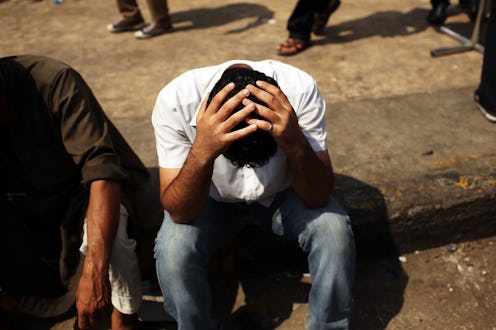News
Egyptian President's Call for Quick Elections Rejected
Egypt's interim President, Adli Mansour, issued a decree late Monday to hold parliamentary elections in early 2014, immediately followed by Presidential elections—but the Muslim Brotherhood party has rejected the timetable as "invalid and illegitimate".
The decree calls for a panel to be formed within the next 15 days in order to review the Islamist-drafted constitution (which was suspended following Morsi's ousting), after which whatever amendments are made are to be finalized and put to referendum in four months. Then, in early 2014, parliamentary elections would be held, and once the the new parliament convenes, presidential elections can finally take place.
According to NPR, the decree "effectively makes the military-appointed president, Adly Mansour, all powerful." Mansour would hold legislative and executive powers until the parliament is elected, and he's given himself the right to declare a state of emergency for three months—which might, if used, mean the military "could more easily clamp down on the coup opponents without having to legally answer for it."
But CNN suggests that Mansour's legislative powers would be limited, and controlled by consultations with a cabinet that would wield veto power.
The decree reportedly included language that defined the principles of Islamic sharia law, putting all human activities into five categories: obligatory, recommended, permitted, disliked or forbidden—perhaps as a peace offering to the Muslim Brotherhood party.
But in spite of this, Mansour's declaration didn't fly with the Brotherhood. A chairman of the Freedom and Justice Party—the Brotherhood's political wing—called it "a constitutional decree by a man appointed by putchists" which "brings the country back to square one."
And the skepticism isn't limited to the Brotherhood: An expert from George Washington University told Reuters that the decree was making many of the same mistakes that were made when Mubarak was removed in 2011.
‘'It was drawn up by an anonymous committee; it was issued by executive fiat; the timetable is rushed; the provisions for consultation are vague; and it promises inclusiveness but gives no clear procedural guidelines for it,'’ the expert told Reuters.
The decree was issued hastily after 51 people were killed and over 400 people were injured in shootings outside the Republican Guard barracks in Cairo on Monday.
It's still not clear what exactly happened in the capital yesterday. Pro-Morsi protestors claim they were staging a peaceful sit-in when they were brutally shot at by the army, while the military maintains it only opened fire after being attacked by an armed terrorist group.
Egyptian state TV reported that "the interim President has ordered the formation of an investigative committee to look into the shooting incident at the Republican Guard headquarters."
Some of the confusion may be due to mixed reporting coming from the region.
Al-Jazeera has recently come under fire for what people are calling "biased" news coverage in favor of the Muslim Brotherhood, with 22 members of staff resigning on Monday.
Following the deaths on Monday, the highest authority in Sunni Islam, Ahmed al-Tayeb, has gone into seclusion until the violence is over, warning of an impending civil war.
More protests and sit-ins are planned for Tuesday, in addition to the funerals which will be held for the protesters who died on Monday, according to the Brotherhood's spokesman Gehad al-Haddad.
These clashes began following ex-President Mohammed Morsi's removal by the army six days ago, after a military ultimatum and days of nationwide demonstrations shook the country. The situation looks precarious to say the least, with many in the international community bracing themselves for even more violence in the region.
